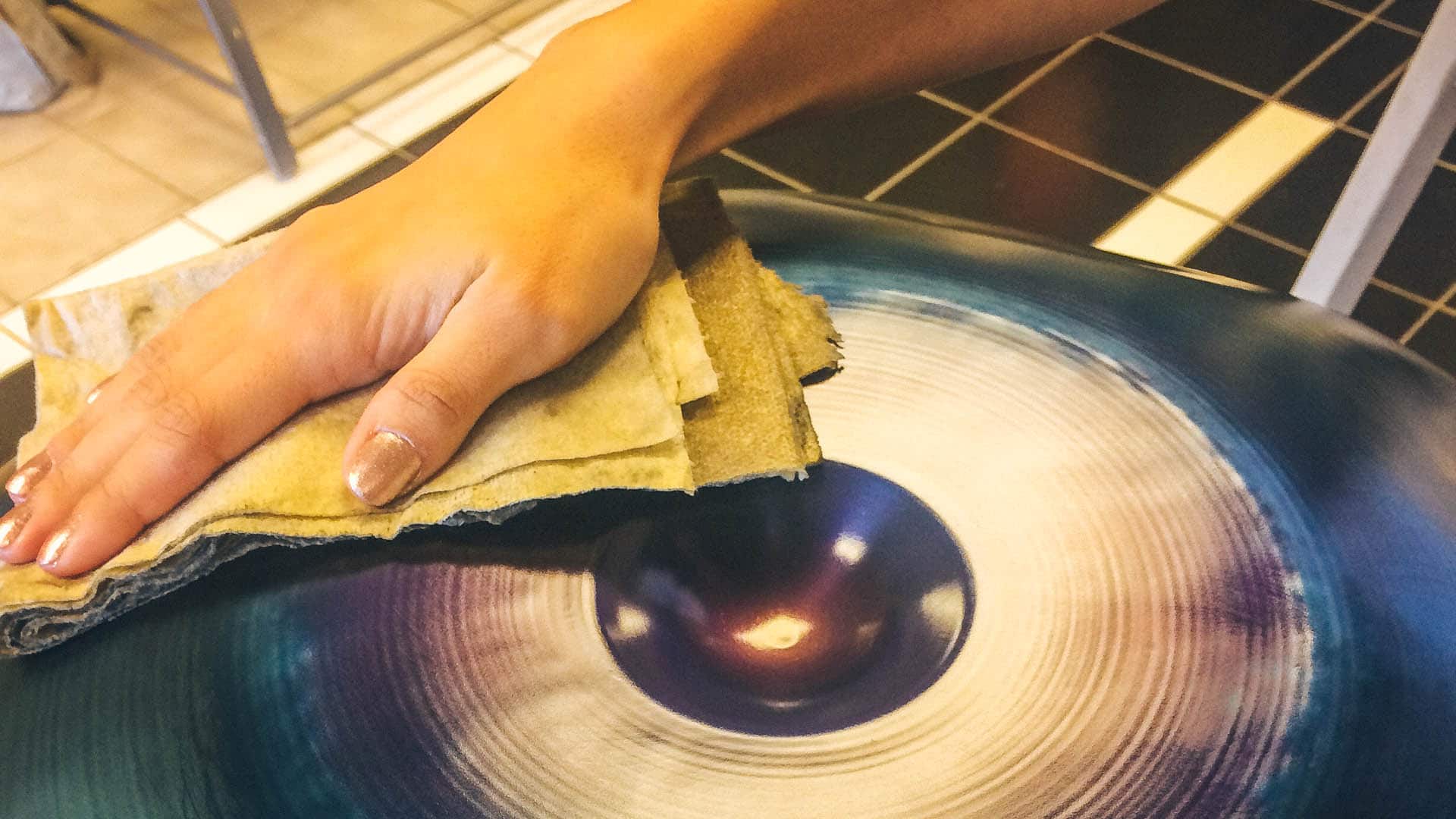Like any other musical instrument, Handpans require regular care and maintenance to ensure their longevity and optimum performance. This guide will provide you with a step-by-step approach to taking care of your Handpan, including cleaning, protection, and rust removal.

Cleaning your Handpan
Cleaning your handpan regularly is essential to prevent dirt and dust buildup, which can damage the surface over time. Here’s a step-by-step guide on how to clean your handpan:
- Start by wiping the surface of your handpan with a soft cloth to remove any dust or dirt particles.
- Add a small amount of mild soap to warm water and mix it gently. Avoid using harsh chemicals or abrasive materials that could scratch the surface of your handpan.
- Dampen the cloth with the soapy water mixture and gently wipe the surface of your handpan, making sure to remove any stubborn dirt or grime.
- Rinse the cloth with clean water and wipe down the handpan again to remove any remaining soap residue.
- Finally, dry the handpan with a clean, dry cloth, making sure to remove any excess moisture.
Protecting your Handpan
Protecting your handpan is essential to ensure its longevity and maintain its appearance. Here are a few tips on how to protect your handpan:
- Always store your handpan in a padded case or bag to protect it from scratches and dings.
- Avoid exposing your handpan to extreme temperatures, as this can cause the metal to expand or contract, leading to damage.
- Never leave your handpan in direct sunlight, as this can cause the metal to become discolored and lose its luster.
- Use a protective wax or oil to prevent rust and corrosion. Be sure to use a product specifically designed for handpans, as other products may contain harsh chemicals that can damage the metal.
Rust Removal from your Handpan
Rust can be a common problem for handpan owners, especially if the instrument is not properly protected or cared for. Here are a few steps to remove rust from your handpan:
- Start by removing any dirt or debris from the rusted area using a soft cloth.
- Mix a small amount of mild soap with warm water and apply it to the rusted area using a soft-bristled brush.
- Use a rust removal solution or paste specifically designed for handpans. Apply the solution or paste to the rusted area and leave it to soak for a few minutes.
- Gently scrub the rusted area with a soft-bristled brush, making sure to remove all the rust.
- Rinse the area with clean water and dry it thoroughly with a soft cloth.
How often do handpans need to be tuned?
Handpans are made of steel and can be susceptible to changes in temperature and humidity. As a result, they may require tuning periodically, especially after extended periods of use or changes in environment.

However, the frequency of tuning will depend on several factors, including the quality of the handpan, the frequency of use, and the environment in which it is stored. Some handpan players may choose to tune their instrument every few months, while others may only need to do so once or twice a year.
Do handpans need to be retuned?
Yes, Handpans may require retuning over time due to changes in temperature, humidity, and frequency of use. It’s important to keep in mind that retuning a Handpan can be a delicate process, and it is recommended that you seek out a professional Handpan tuner to do so.
Attempting to tune a Handpan without proper training can result in irreparable damage to the instrument, so it’s essential to work with someone who has the necessary skills and experience.
How do I know if my handpan is good?
There are several factors to consider when determining the quality of a handpan, including its sound, craftsmanship, and materials. A good handpan should produce clear, harmonious notes with a sustained resonance. The craftsmanship of the instrument should be precise and well-executed, with smooth and consistent surfaces and well-defined notes.
High-quality Handpans are typically made from high-grade steel or other durable materials that can withstand the rigors of extended use. It’s also essential to work with a reputable Handpan maker or dealer who can provide you with the necessary information and guidance to make an informed purchase.
FAQs
How often should I clean my Handpan?
It is recommended to clean your Handpan after each use to prevent dirt and dust buildup.
Can I use regular cleaning products on my Handpan?
No, you should avoid using harsh chemicals or abrasive materials on your handpan, as they can damage the surface. Always use mild soap and water or a product specifically designed for handpans.
Can rust be prevented on my Handpan?
Yes, rust can be prevented by using a protective wax or oil specifically designed for Handpans. Regular cleaning and proper storage can also help prevent rust.
Conclusion
Taking care of your Handpan is crucial to ensure its longevity and performance. Regular cleaning, protection, and rust removal are all essential components of Handpan care. By taking the time to properly care for your Handpan, you can enjoy playing beautiful music and preserving your investment for years to come.



[…] care of a handpan involves several important steps. First, it is important to store the handpan in a safe and dry […]